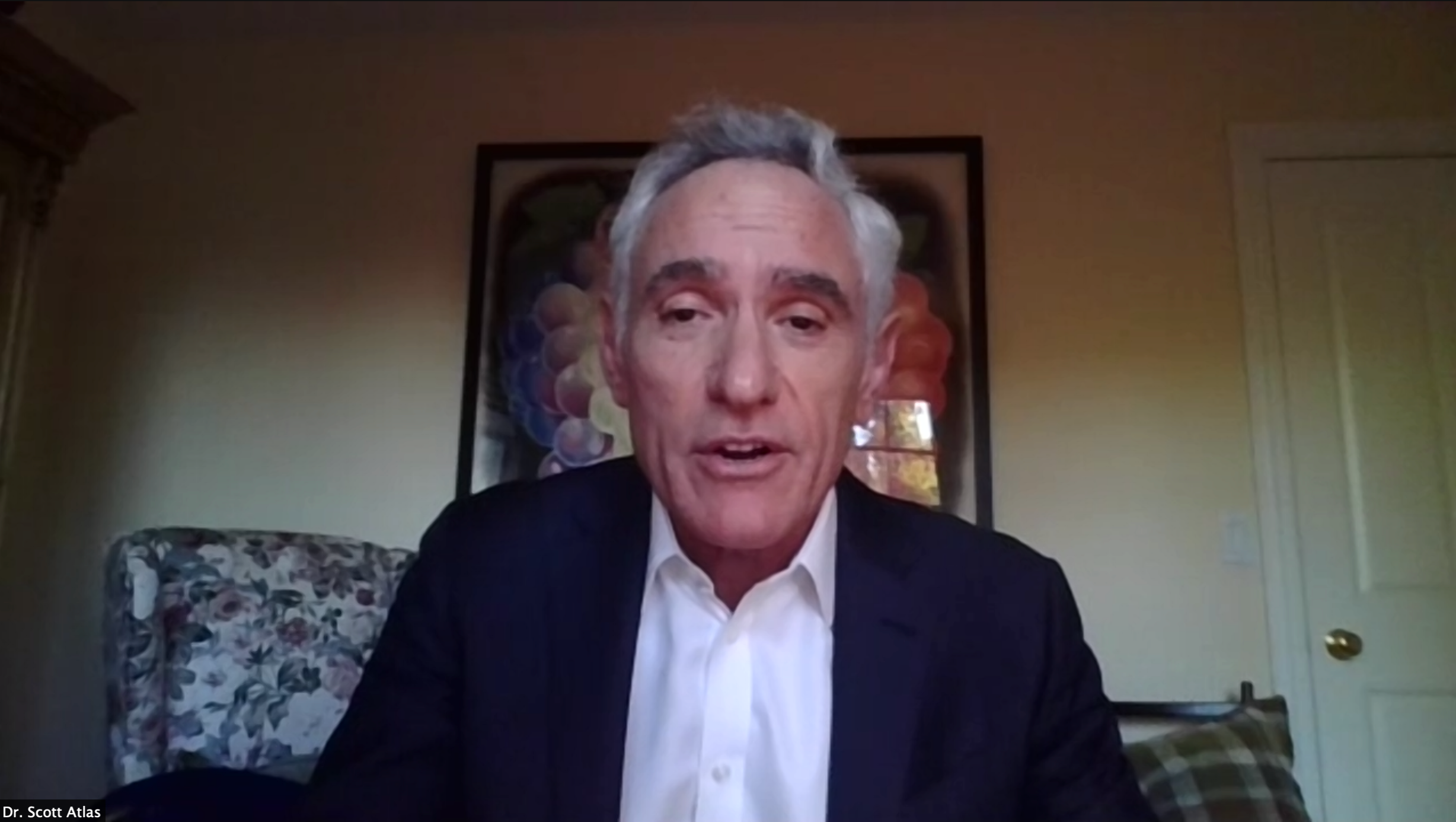Throughout the pandemic, Hoover Institution senior fellow Scott Atlas has repeatedly pushed groundless claims about pandemic mitigation strategies. But he used his Friday showing at an event hosted by the Stanford College Republicans to claim he had never put forth such statements — including those regarding mask wearing and herd immunity — while continuing to argue for their validity.
Entering the White House position, Atlas said that he was “naive” about politics and did not expect the wave of criticism he received. When asked whether he would accept a position in a future Republican presidential administration, Atlas said he would not return to “that kind of poisonous atmosphere.”
Atlas was named special adviser to Trump and member of the White House Coronavirus Task Force in August following frequent appearances on Fox News, where he promoted baseless pandemic mitigation strategies unsupported by most infectious disease experts. While Atlas was in Washington, the Stanford faculty was forced to confront questions over the limits of academic freedom.
At the event, Atlas said he was the target of cancel culture and an effort to silence and delegitimize him using “falsifications and misrepresentations,” which he alleges damages the University’s reputation and “dishonors” the Stanford Code of Conduct.
“Instead of rethinking failed policies and admitting their errors, some faculty members have chosen to employ smears and opinion pieces,” Atlas said, commending Stanford President Marc Tessier-Lavigne, Provost Persis Drell and former provost John Etchemendy for their “defense of academic freedom.”
In a forceful condemnation of Atlas, 105 epidemiological, infectious disease and health policy experts at Stanford denounced the “falsehoods and misrepresentations of science recently fostered” by the Hoover fellow in an open letter published in September.
After he encouraged Michigan residents to “rise up” against new restrictions imposed by Gov. Gretchen Whitmer, Stanford distanced itself from Atlas and the Faculty Senate voted 85 to 15 to condemn him for promoting “a view of COVID-19 that contradicts medical science.”
Atlas took aim at the faculty, saying that he can understand that most are “ignorant” of the data and science of the pandemic. “But it is not acceptable to claim that I made recommendations that were ‘falsehoods and misrepresentations of science.’ That is a lie,” he said.
But his views have been repeatedly denounced by experts in medicine.
Former dean of the School of Medicine Philip Pizzo, associate chair of psychiatry and behavioral sciences David Spiegel and medicine and law professor Michelle Mello detailed the effects of Atlas’ views in a recent Journal of the American Medical Association article, writing that “nearly all public health experts were concerned that his recommendations could lead to tens of thousands (or more) of unnecessary deaths in the US alone.”
Atlas also used the event to try and rewrite and recontextualize his past statements about herd immunity, mask wearing and the effect of the disease on children. In each case, he either downplayed his previous statements or had claimed he had never made them in the first place.
In September, he drew sharp criticism after reports surfaced that he had advocated a herd immunity strategy — in which the virus is deprived of carriers when enough of the population is infected with COVID-19 through unchecked community spread — to Trump.
He addressed this in his prepared remarks. “I explained the biological concept of herd immunity: protection arising in a large percentage of people acquiring immunity,” Atlas said. “That is very different from proposing people be deliberately exposed and infected by allowing the virus to spread naturally.”
This is inconsistent with his past statements. Atlas publicly asserted throughout the early stages of the pandemic that a herd immunity policy was one of the best ways to “eradicate the threat of the virus.” Atlas wrote in an April op-ed in The Hill that “infected people without severe illness are the immediately available vehicle for establishing widespread immunity” and said in a July Fox News Radio interview that low-risk groups becoming infected would be “a positive” — indicating support for community spread while keeping the most vulnerable isolated.
Many of Atlas’ critics and experts in epidemiology casted doubt on his qualifications to advise the government on matters related to public health, noting that he is a neuroradiologist, not an infectious disease expert. Stanford professors of medicine Melissa Bondy and Steven Goodman wrote in the Los Angeles Times in September that Atlas’ “pseudo-expertise” should not be leading the U.S. government’s efforts to combat COVID-19.
But Atlas said at the event that his credentials as a health policy expert made him uniquely positioned to understand the broader impacts of mitigation efforts, citing the harm lockdowns and school closures are having on education, mental health and delayed medical attention for non-pandemic related illnesses.
“To manage such a crisis, shouldn’t policy makers objectively consider both the virus’ harms and the totality of impact of the policies?” Atlas questioned. “That is the importance of health policy experts in my field with a broader scope of expertise than that of epidemiologists or basic scientists.”
However, Atlas’s misleading views may have had grave effects on the nation’s efforts to combat the spread of the coronavirus. Deborah Birx, the former coordinator of the coronavirus task force, disclosed in an interview that “parallel data streams” were being provided to Trump by Atlas. And he was reportedly the driving force behind a change in the Center for Disease Control and Prevention’s guidance that advised against testing asymptomatic individuals. That guidance was later reversed.
